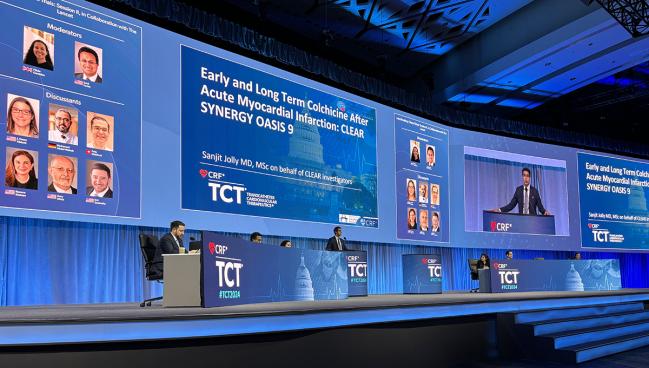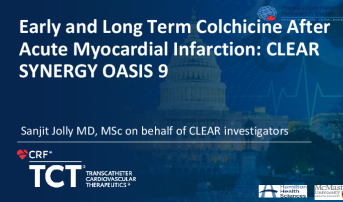Colchicine Surprise: No Help Post-MI, Large CLEAR SYNERGY Trial Shows
The study conflicts with two prior trials showing a benefit and may warrant colchicine’s reconsideration in the guidelines.

WASHINGTON, DC—The routine use of colchicine, an anti-inflammatory agent with a challenging side-effect profile, fails to reduce the risk of major adverse cardiovascular events when used in patients treated with PCI after acute myocardial infarction, results from the CLEAR SYNERGY (OASIS 9) trial show.
The data, presented today during a late-breaking clinical trials session at TCT 2024, confounded researchers given that two prior studies—COLCOT and LoDoCo2—showed a significant 23% and 31% reduction in cardiovascular events in the setting of acute MI and stable coronary artery disease, respectively.
“We were very surprised,” lead investigator Sanjit Jolly, MD (Hamilton Health Sciences/Population Health Research Institute, Canada), told TCTMD. “We really tried to understand if there was something about this trial, but every way we sliced it, the result was very neutral.”
When the two prior positive trials were published, Jolly said they reached out to the data safety and monitoring board to ask if CLEAR SYNERGY should continue, which was encouraged. Given their finding now, Jolly said he expects changes in clinical practice.
“We believe that this is important because it really should give clinicians pause,” said Jolly. “On balance, when you look at this trial, we didn't see a reduction in cardiovascular outcomes, and unfortunately there was a side effect to the therapy—diarrhea.” On a personal level, Jolly had wholeheartedly believed in colchicine’s effectiveness given the prior two trials, but his opinion has since changed.
“My father had an MI and I put him on colchicine,” he said. “I've just taken him off.”
Ajay Kirtane, MD (NewYork-Presbyterian/Columbia University Irving Medical Center, New York, NY), called CLEAR SYNERGY a “big deal.”
“When we talk about patients after an MI, we want to make sure they're taking antiplatelet therapy,” he said. “We want to make sure their left ventricle is supported with guideline-directed medical therapy. We make choices here and this medicine is not well tolerated. The data previously was so-so and now with this trial, I would not want to start a patient on [colchicine]. I never wanted to start a patient on it and now I have good rationale for not doing so.”
Jean-Claude Tardif, MD, PhD (Montreal Heart Institute, Canada), who led the COLCOT trial, disagrees with that interpretation of the evidence and disputes the characterization that colchicine is an ineffective drug. In addition to COLCOT and LoDoCo2, he cited a recently published meta-analysis of six trials with nearly 15,000 patients who had prior stroke or coronary disease. In that analysis, colchicine reduced the risk of ischemic stroke and MACE, a benefit that was consistent across key subgroups.
“The odd player out is [CLEAR SYNERGY], not the other trials,” Tardif told TCTMD.
No Difference in Primary Outcome
CLEAR SYNERGY (OASIS 9) is a 2 x 2 randomized controlled trial of low-dose colchicine 0.5 mg daily versus placebo and spironolactone 25 mg daily versus placebo in 7,062 post-MI participants (mean age 60.5 years; 20% female) treated within 72 hours of the index PCI. Roughly 95% of patients had presented with STEMI, and 96% were treated with a drug-eluting stent.
From baseline to 3 months, C-reactive protein (CRP) levels declined in both treatment arms, with significantly larger reductions seen with colchicine.
The primary endpoint of cardiovascular death, MI, stroke, or ischemia-driven revascularization occurred in 9.1% and 9.3% of colchicine- and placebo-treated patients after a median of 3.5 years, a nonsignificant difference. There was no benefit in any of the individual endpoints, but noncardiovascular deaths were lower in the colchicine arm, a finding that is likely the play of chance, say investigators. An on-treatment analysis, done given the challenges of remaining on colchicine, was nearly identical to the overall findings.
My father had an MI and I put him on colchicine. I've just taken him off. Sanjit Jolly
Prespecified subgroup analyses revealed no benefit to colchicine in any patient group, although there was a trend toward fewer MACE events in patients weighing 70 kg or more treated twice daily with colchicine 0.5 mg. That dosing regimen, however, was abandoned early in the trial given the higher rate of side effects along with other trial findings.
Adverse events were not significantly different between the two groups, but rates of diarrhea were significantly greater with colchicine (10.2% vs 6.6%; P < 0.001).
Debating the Results
As to why their study was negative while two other trials were positive, Jolly noted that there were just 301 primary-outcome events in COLCOT—the trial that most closely resembled CLEAR SYNERGY—and that the benefit was largely driven by urgent hospitalizations for angina leading to revascularization.
“We had more than double the number of events,” said Jolly. “So, I think, it may just be regression to the mean. You may have earlier, smaller trials that are positive and then as time goes on, you get more data. We can’t rule out smaller treatment effects, but the truth is that there may be no effect, or a very, very modest effect.”
I never wanted to start a patient on it and now I have good rationale for not doing so. Ajay Kirtane
In the European Society of Cardiology guidelines for the treatment of patients with chronic coronary syndromes (CCS), low-dose colchicine was recently awarded a class 2a indication for treatment of residual inflammation. Colchicine was also approved by the US Food and Drug Administration for the reduction of CVD events in high-risk patients and those with atherosclerotic cardiovascular disease. In the American College of Cardiology/American Heart Association CCS guidelines, colchicine is a class 2b recommendation.
For Jolly, there’s now enough uncertainty around the effectiveness of colchicine that guideline committees will need to revisit the evidence. “It probably needs to be a weak recommendation, if it’s a recommendation at all,” he told TCTMD.
J. Dawn Abbott, MD (Brown University Health, Providence, RI), one of panelists during the session, agreed, saying the guidelines will need to be “adjusted.”
Guideline Change Would Be ‘Mistake’
For Tardif, however, any changes to the current guidelines would be a “mistake.” There are several reasons why CLEAR SYNERGY was neutral, he said, including the fact that the trial took place during the COVID-19 pandemic when healthcare systems were thrown into disarray. In the subgroup analysis looking at outcomes stratified by COVID-19 phase, there was a suggestion of benefit with colchicine prior to the pandemic, although the statistical test for interaction was negative (P = 0.098), he said.
“If you look before COVID, the effect was actually right in line with COLCOT and LoDoCo2 with a 22% relative risk reduction and the effect was lost with COVID,” he said.
Tardif also doesn’t believe investigators properly tested the inflammatory hypothesis, noting that these high-risk STEMI patients had very high CRP levels at baseline and after treatment (3.0 vs 4.3 mg/dL in the colchicine and placebo arms at 3 months). “In all the other trials, we were able to lower CRP to less than 2.0 mg/L,” he said, noting that this translated into a better clinical outcomes. He suspects colchicine’s sweet spot for effectiveness is in patients with low-to-moderate systemic inflammation, not like those in CLEAR SYNERGY with large STEMIs.
Wayne Batchelor, MD (Inova Heart and Vascular Institute, Fairfax, VA), who spoke with the media, has made up his mind about colchicine and won’t use it in light of CLEAR SYNERGY. “There’s no signal whatsoever, other than diarrhea,” he said.
He cautioned, however, against “throwing the baby out with the bath water,” noting that inflammation after MI remains an active area of research. Several years back, the CANTOS researchers showed that treatment with canakinumab, a human monoclonal antibody targeting an inflammatory cytokine, reduced the risk of MACE in post-MI patients with elevated CRP, but the drug manufacturer chose not to pursue a cardiovascular indication.
ARTEMIS, a large-scale trial of approximately 10,000 patients, recently launched to test whether a novel interleukin-6 inhibitor (Ziltivekimab; Novo Nordisk) can reduce the risk of recurrent events in the setting of acute MI.
Michael O’Riordan is the Managing Editor for TCTMD. He completed his undergraduate degrees at Queen’s University in Kingston, ON, and…
Read Full BioSources
Jolly S. Early and long-term colchicine after acute myocardial infarction: CLEAR SYNERGY OASIS 9. Presented at: TCT 2024. October 29, 2024, Washington, DC.
Disclosures
- Jolly reports grant/research support from Boston Scientific and consulting fees from Teleflex, Asahi, Shockwave, and Abiomed.






Comments